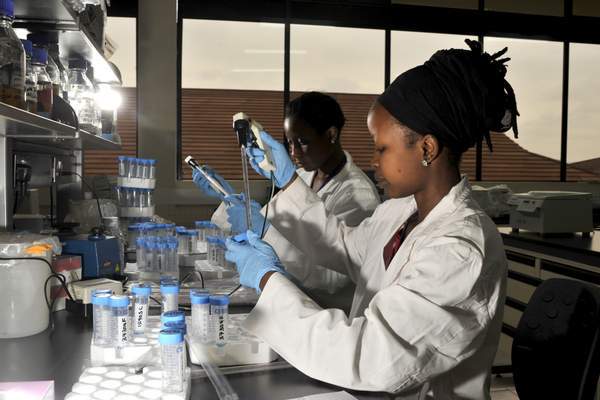International Research Laboratory breeding Nairobi, managed by ILRI-BecA
"Researchers who seek are found, but the researchers found that one looks in"
This assertion him alone summarizes the perception of citizens about researchers in many countries. Being a researcher is considered, rightly or wrongly as a member of a class of person that works recluse way on subjects which interest is hardly noticeable to the majority of people.
In Kigali, on Monday 13 June the 7th Week of Agricultural Sciences in Africa (# AASW7) organized by the Forum for Agricultural Research in Africa / FARA is under the theme "Apply science, livelihoods impact." An official translation exists, I can venture to translate the theme "Science applied, impact on livelihoods."
In short how science can influence, impact the lives of especially agricultural populations. The opening ceremony is one of the classics: Welcome words, handed trophy, official opening ceremony, business stands (exhibition room), interview of journalists and official departure.
This week in agricultural science takes place in a context where hunger and malnutrition are realities in Africa, especially south of the Sahara. Innovations and solutions for better agricultural practice is slowly spreading among farmers.
What science for African agriculture?
This question is just as provocative. African agriculture faces long diagnosed evils: poor access to innovations and technical enough untapped areas, inadequate agricultural research to farmers' needs. However, an African country is cited as an example in the adaptation of science to the needs of farmers: Rwanda.
At the corner booth visit, we traded with herringbone Telesphore Ndabamenye, "Head of Crop Production & Food Security Department" to "Rwanda Agriculture Board" to better understand "the miracle Rwandans".
Why continue to do research on locusts in Malawi while our farmers have the problem of attack on the cornfields? Why not direct the research and extension of our experienced farmers? In Rwanda, the amalgamation of services for research and extension that allowed good quality at the plant and animal production. This merger was to make information available and accessible to farmers, facilitate technology transfer and especially to pool resources.
The example of Rwanda?
The change in attitude of the producer, popularizer and researcher builds a team that exchange and improve daily practice. Fluid communication between the three entities has proven beneficial for the transfer of knowledge. Exit the isolated researcher in his laboratory, Mr Ndabamenye faith. In terms of methodology of work, are tripartite meetings, definitions of needs, joint planning of the entity at the base to the top. Note that the Rwanda Agriculture Board has a department responsible for information dissemination.
In conclusion to the latter, the foundations for sustainable agriculture are in an integrated and research-oriented solving challenge of producers.
Blogpost by Minata Coulibaly, sehe20 (at) gmail.com, # AASW7 social reporter.
This post Represents the author's views only.
Picture courtesy ILRI

No comments:
Post a Comment